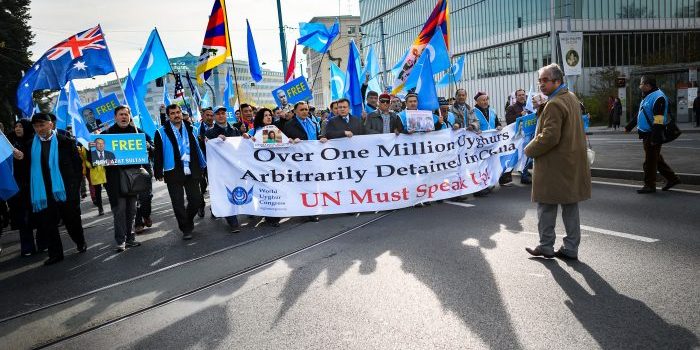Last fall, 646 international scholars signed a statement condemning the internment of Uyghurs and other Turkic Muslim minorities in the Xinjiang (East Turkistan) region of western China, stressing that mass internment of citizens on the basis of ethno-cultural and religious identity is unprecedented in the twenty-first century and should not be tolerated by the international community.
Prisoners are subjected to highly invasive forms of surveillance and psychological stress as they are forced to abandon their language, religious beliefs and cultural practices. Beyond the camps, more than ten million Uyghurs and other Turkic Muslims are subjected to a dense network of surveillance systems and checkpoints which severely limit their personal freedom.
The academics from 40 countries called on governments, multi-lateral organizations, businesses, and academic institutions to apply pressure on the Beijing party-state to cease its campaign of unprecedented repression.
First conquered by the Qing dynasty in the 18th century and later by Mao Zedong in 1949, many Uyghurs, frustrated at being a conquered people, became even more frustrated in the 1990s, as central Asian republics gained independence from the former Soviet Union.
They were already alienated by long term discrimination by Chinese officials, including difficulty accessing passports, hotels, and banking services. Legitimate requests for more religious and cultural respect were viewed as “terrorism.”
Academic Adrian Zenz of the School of Culture and Theology in Germany estimates that without any trace of due process there are now more than a million Uyghurs of Xinjiang (East Turkistan) aged 20 – 79 incarcerated in up to 1,200 facilities. In a talk at Harvard University’s Fairbank Center for Chinese Studies, he noted that at the bleak internment camps, inmates are exposed to endless hours of “re-education” forcing them to think like Beijing.
Zenz added that the intent of the brainwashing is to “kill the memory of who they are, wipe out their separate identity, language and history…even the slightest perceived infraction, such as having a copy of the Koran on a phone or making a contact abroad, can result in incarceration.”
In 2017, the Chinese regime began erecting a “re-education” gulag for Uyghur and other Muslim communities. It was similar to the forced labor camps established across China after mid- 1999 for Falun Gong and other prisoners of conscience. Both networks receive inmates arrested by public security agencies without any pretence of a hearing, trial, or appeal.
Last October, a human rights subcommittee of Canada’s House of Commons studied the Uyghur situation. Expert witnesses described unsanitary facilities where starvation prevails, detainees are punished through physical and psychological ill-treatment, and deaths occur, particularly among the elderly and infirm. Witnesses called for Canada to demand that China allow independent human rights investigators into Xinjiang (East Turkistan).
Witnesses said that to date the international community as a whole has failed both to hold China accountable and to protect the Turkic Muslim minority. Some urged Canada to coordinate its efforts with like-minded states to condemn publicly China’s party-state for its actions. Others called for the imposition of targeted economic measures against officials who have led the repression.
Author Robert D. Kaplan adds: “The repression of the Turkic Uyghur Muslim community in western China…is a key part of Beijing’s new imperial policy.” He judges that China’s massive Belt and Road Initiative “requires the complete subjugation of the Uyghur population.”
The brutal campaign has caused Uyghurs to flee to central and southeast Asia to escape. They share ethnic, linguistic, and religious ties with Central Asian populations—Kazakhstan, Kyrgyzstan, and Tajikistan, which border Xinjiang (East Turkistan)—but which are now all economically dependent on China and have yielded to Beijing pressure on the Uyghurs. The Shanghai Cooperation Organization has institutionalized the Central Asian countries’ security cooperation, directly targeting Uyghurs.
Forced organ pillaging from Uyghurs for profit by the party-state appears to have preceded that from Falun Gong. Nobel Peace Prize nominee and co-founder of the International Coalition to end Organ Abuse in China Ethan Gutmann’s 2014 book, “The Slaughter,” places the persecution of the Falun Gong, Tibetan, Uyghur, and Eastern Lightening Christian communities in context. He explains how he arrived at his “best estimate” that organs of 65,000 Falun Gong and “two to four thousand” Uyghurs, Tibetans and Christians were “harvested” in the 2000- 2008 period.
The Uyghur leadership internationally, aware of the common plight victims of increasing Chinese totalitarianism under Xi face, has shown solidarity with Falun Gong. Governments should continue protesting victimization of the Uyghur community. The 2018 Universal Periodic Review (U.P.R.) by the UN Human Rights Council showed glimmers of light, but future efforts should not wait till China’s next turn in the U.P.R. cycle several years from now.
As the birthday of the Scottish national poet, Robbie Burns, is commemorated, words from his 1784 dirge are still meaningful: “Man’s inhumanity to man makes countless thousands mourn!”
Both faith and secular communities worldwide, especially the Muslim-majority nations, should speak out about the tragedy unfolding for Uyghurs across Xinjiang (East Turkistan).
David Kilgour, a lawyer by profession, served in Canada’s House of Commons for almost 27 years. In Jean Chrétien’s Cabinet, he was secretary of state (Latin America and Africa) and secretary of state (Asia-Pacific). He is the author of several books and co-author with David Matas of “Bloody Harvest: The Killing of Falun Gong for Their Organs.”






